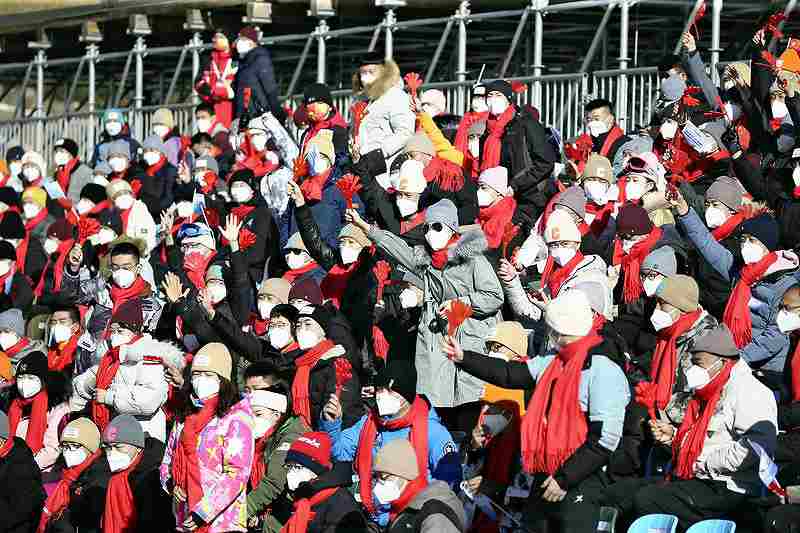Japan weighing options as calls for political boycott of Beijing Games start to simmer

Spectators watch a test event for the upcoming Winter Olympics at Zhangjiakou in Hebei Province, China, on Nov. 27.
December 8, 2021
To boycott, or not to boycott — that is the thorny question facing the government.
Instead of immediately following in the footsteps of the United States, which has announced it will not send government officials to the 2022 Beijing Winter Olympics, the Japanese government is planning to watch the moves of fellow members of the Group of Seven nations and other developments right up until the Games begin.
China decided against sending a vice premier to the opening ceremony of this summer’s Tokyo Olympics. Instead, they sent a minister-level official, the chief of the Chinese Olympic delegation, who was also head of the General Administration of Sport of China.
This was widely believed to have been the result of a widening rift between Japan and China over issues including the situation in Taiwan.
It is said that some government officials have floated the idea of sending Japan Sports Agency Commissioner Koji Murofushi or Japanese Olympic Committee President Yasuhiro Yamashita to the upcoming Beijing Games.
“We should dispatch officials of the same level as those China dispatched to the Tokyo Olympics,” a senior official at the Prime Minister’s Office said.
Top leaders from the United States and Europe did not attend the opening ceremony of the 2014 Sochi Winter Games due to concerns over the human rights situation in Russia. However, then Prime Minister Shinzo Abe attended the ceremony and also held talks with Russian President Vladimir Putin during his trip.
Abe also attended the opening ceremony of the 2018 PyeongChang Winter Olympics and met with South Korean President Moon Jae-in for talks. Diplomatic motivations were partly behind both trips, as Abe sought to shore up negotiations over the northern territories and cooperation on North Korea issues, among other matters.
Support for a diplomatic boycott of the Beijing Games, in line with the U.S. approach, is growing within some quarters of the ruling Liberal Democratic Party.
A group of 68 conservative lawmakers met with Prime Minister Fumio Kishida at the Prime Minister’s Office on Tuesday, urging him not to send a diplomatic delegation to the Beijing Games due to concerns over human rights issues in Hong Kong, Tibet, the Xinjiang Uygur Autonomous Region and elsewhere in China.
“We should clearly demonstrate our position of not accepting any human rights violations by China,” said Shigeharu Aoyama, a House of Councillors lawmaker who heads the group.
Next year will mark the 50th anniversary of the normalization of diplomatic relations between Japan and China, and expectations for improved bilateral ties remain strong within Japanese economic circles.
“We mustn’t unilaterally cause China to lose face,” a senior Foreign Ministry official said.
As the Games approach, the government has a difficult decision to make.
Top Articles in Politics
-

Japan PM Takaichi’s Cabinet Resigns en Masse
-

Sanae Takaichi Elected Prime Minister of Japan; Keeps All Cabinet Appointees from Previous Term
-

Japan’s Govt to Submit Road Map for Growth Strategy in March, PM Takaichi to Announce in Upcoming Policy Speech
-

LDP Wins Historic Landslide Victory
-

LDP Wins Landslide Victory, Secures Single-party Majority; Ruling Coalition with JIP Poised to Secure Over 300 seats (UPDATE 1)
JN ACCESS RANKING
-

Japan PM Takaichi’s Cabinet Resigns en Masse
-

Japan Institute to Use Domestic Commercial Optical Lattice Clock to Set Japan Standard Time
-

Israeli Ambassador to Japan Speaks about Japan’s Role in the Reconstruction of Gaza
-

Man Infected with Measles Reportedly Dined at Restaurant in Tokyo Station
-

Videos Plagiarized, Reposted with False Subtitles Claiming ‘Ryukyu Belongs to China’; Anti-China False Information Also Posted in Japan





















